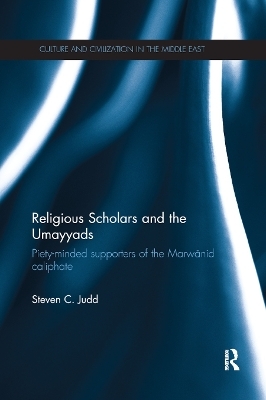
Religious Scholars and the Umayyads
Piety-Minded Supporters of the Marwanid Caliphate
Seiten
2019
Routledge (Verlag)
978-0-367-86831-4 (ISBN)
Routledge (Verlag)
978-0-367-86831-4 (ISBN)
Religious Scholars and the Umayyads analyzes legal and theological developments during the Marwānid period (64/684--132/750), focusing on religious scholars who supported the Umayyad caliphate. It includes a prosopographical study of Umayyad-era scholars and offers a new approach to using later Arabic historical sources to study
Religious Scholars and the Umayyads analyzes legal and theological developments during the Marwānid period (64/684--132/750), focusing on religious scholars who supported the Umayyads. Their scholarly network extended across several generations and significantly influenced the development of the Islamic faith. Umayyad qādòīs, who represented the intersection of religious authority and imperial power, were particularly important.
This book challenges the long-standing paradigm that the emerging Muslim faith was shaped by religious dissenters who were hostile to the Umayyads. A prosopographical analysis of Umayyad-era scholars demonstrates that piety and opposition were not necessarily synonymous. Reputable scholars served as qādòīs, tutors and advisors to Umayyad caliphs and governors. Their religious credentials were untarnished by their association with the Umayyads and they appear prominently in later hòadīth collections and fiqh works.
This historiographical study demonstrates that excessive reliance on al-Tòabarī’s chronicle has distorted the image of the Umayyads. Alternatively, biographical sources produced by later hòadīth scholars reveal a rich tradition of Umayyad-era religious scholarship that undermines al-Tòabarī’s assumptions. Offering a better understanding of early Islamic religious development, this book is a valuable resource for students and researchers in the fields of Islamic history, Islamic legal studies and Arabic historiography.
Religious Scholars and the Umayyads analyzes legal and theological developments during the Marwānid period (64/684--132/750), focusing on religious scholars who supported the Umayyads. Their scholarly network extended across several generations and significantly influenced the development of the Islamic faith. Umayyad qādòīs, who represented the intersection of religious authority and imperial power, were particularly important.
This book challenges the long-standing paradigm that the emerging Muslim faith was shaped by religious dissenters who were hostile to the Umayyads. A prosopographical analysis of Umayyad-era scholars demonstrates that piety and opposition were not necessarily synonymous. Reputable scholars served as qādòīs, tutors and advisors to Umayyad caliphs and governors. Their religious credentials were untarnished by their association with the Umayyads and they appear prominently in later hòadīth collections and fiqh works.
This historiographical study demonstrates that excessive reliance on al-Tòabarī’s chronicle has distorted the image of the Umayyads. Alternatively, biographical sources produced by later hòadīth scholars reveal a rich tradition of Umayyad-era religious scholarship that undermines al-Tòabarī’s assumptions. Offering a better understanding of early Islamic religious development, this book is a valuable resource for students and researchers in the fields of Islamic history, Islamic legal studies and Arabic historiography.
Steven C. Judd is Professor of Middle East History at Southern Connecticut State University. He has written extensively on the Umayyad period, focusing on history, historiography, theology and legal studies.
Part I: The Umayyad Problem in Early Islamic History 1 Umayyad Scholars in Modern Academic Literature 2 The Problem of Sources Part II: The Pillars of Umayyad Piety 3 Al-Sha’bi (d.ca. 103/721-109/727) 4 Al-Zuhri (d. 124/742) 5 Abdallah b. ‘Aun (d. 151/768) 6 Al-Awza’i (d. 157/774) 7 Sufyan al-Thawi (d.161/778) Part III: The Qadi’in Umayyad Society 8 The Function of the Qadi under the Umayyads 9 The NETWORK OF Umayyad Qadis Conclusion 10 The Legacy of Pro-Umayyad Scholars
| Erscheinungsdatum | 16.12.2019 |
|---|---|
| Reihe/Serie | Culture and Civilization in the Middle East |
| Verlagsort | London |
| Sprache | englisch |
| Maße | 156 x 234 mm |
| Gewicht | 540 g |
| Themenwelt | Geschichte ► Allgemeine Geschichte ► Mittelalter |
| Geisteswissenschaften ► Geschichte ► Regional- / Ländergeschichte | |
| Geisteswissenschaften ► Religion / Theologie ► Islam | |
| Sozialwissenschaften ► Soziologie ► Spezielle Soziologien | |
| ISBN-10 | 0-367-86831-8 / 0367868318 |
| ISBN-13 | 978-0-367-86831-4 / 9780367868314 |
| Zustand | Neuware |
| Informationen gemäß Produktsicherheitsverordnung (GPSR) | |
| Haben Sie eine Frage zum Produkt? |
Mehr entdecken
aus dem Bereich
aus dem Bereich
eine neue Geschichte des Mittelalters
Buch | Hardcover (2023)
C.H.Beck (Verlag)
38,00 €
unterwegs mit Pilgern, Rittern, Abenteurern
Buch | Hardcover (2024)
S. Fischer (Verlag)
28,00 €


